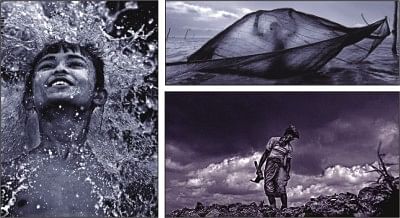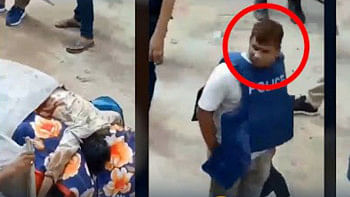Changes from within

Photographs by Saiful Huq Omi
"Could you please bring a cup of tea for the guest?" -- This was the starting point of a conversation photographer Saiful Huq Omi recorded. Omi was interviewing Nazmun Nahar Mukul, president of a Water Management Association in Patuakhali. The request does not sound unusual, yet in our country -- particularly in rural areas -- we do not hear a wife asking her husband to make tea that often. This was a sign of change, the photographer observed. A change from within.
Thanks to programmes -- undertaken by Integrated Planning for Sustainable Water Management (IPSWAM) and Char Development and Settlement Project (CDSP) -- involving people at the grass roots level, the landless and the marginalised, a gradual change is noticeable in the rural areas.
Omi decided to record this change. For the project he went to Khulna, Patuakhali and Noakhali; it took a month -- around 10 days in each area. Photos taken by him highlights different aspects of change, the most profound being gender equation.
These photographs are on display at the exhibition, "Partnership in Practice". The exhibition at Drik Gallery opened by Bea ten Tusscher, the Dutch Ambassador, on May 1 ends today.
The IPSWAM programme is undertaken by the Ministry of Water Resources, Bangladesh Government in cooperation with the Dutch Government. It is implemented by the Third Planning Directorate (DP-III) of the Bangladesh Water Development Board (BWDB), with assistance of the consultants Arcadis-Euroconsult of the Netherlands and Socioconsult of Bangladesh.
All photos at the exhibition are black and white. According to Omi, "Black and white is my preferred medium. I feel that colour is sometimes overpowering and it becomes the subject itself."
The project was funded by Dutch Embassy in Bangladesh through IPSWAM. Omi has contributed a major share of his remuneration to IPSWAM.
The exhibition will likely go to UK and Netherlands soon.
Asked what inspired him to take on this project, Omi says his friend Andrew Jenkins, team leader of IPSWAM, often talked about the social changes in the areas he worked.
"When I was working in these areas, I noticed that the villagers treat the field workers like family members. I met women who don't think they are less capable than men, and more importantly the men have started to feel the same. This journey has induced an enormous sense of respect in me for the hardworking government officials labouring day in day out to improve the lives of the dirt poor.
"I met field workers who wake up with the sun, travel miles -- from one village to another, talk to people, try to understand their problems and at the end of the day help them realise their own strength -- the strength to solve their problems and change their future," Omi says.
Photograph of a labourer, with his spade, ready to strike is quite dramatic. The sky with an abundance of dark clouds in the background looks ominous but the worker sports a faint smile.
Another photo frames a middle-aged man seemingly content with his pigeon. An image shows dusk settling down on Boyar Char; man or cattle -- time for everyone to return home.
But all is not hunky dory. Photographs also bring in despair and calamity in the making. A photo shows erosion in Caring Char. Every year river erosion leaves thousands homeless.
Jossna Ara Begum's story is not unfamiliar. She had everything -- a husband and arable land. One night the river swallowed all -- the house, land and their belongings. Jossna's husband left home to find work and never returned. When she looks at her starving children, Jossna wants to kill herself.
Despite all the adversities and all the trauma, people in these remote regions have not lost hope. And so, they march on, thanks to the help these development projects are providing. A change is underway.

 For all latest news, follow The Daily Star's Google News channel.
For all latest news, follow The Daily Star's Google News channel. 




Comments